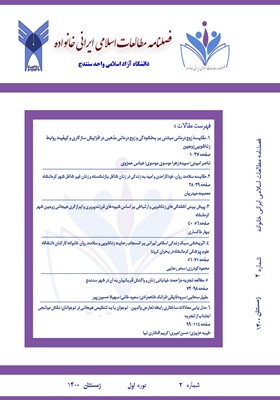مقایسه زوج درمانی مبتنی بر بخشودگی و زوج درمانی مذهبی در افزایش سازگاری و کیفیت روابط زناشویی زوجین
محورهای موضوعی : مطالعات اسلامی ایرانی خانواده
ناصر امینی
1
*
,
سیده زهرا موسوی
2
,
عباس حمزوی
3
*
![]()
1 - استادیار گروه روانشناسی و مشاوره، واحد بوشهر، دانشگاه آزاد اسلامی، بوشهر، ایران
2 - کارشناسی ارشد روانشناسی عمومی، گروه روانشناسی، واحد بوشهر، دانشگاه آزاد اسلامی، بوشهر، ایران
3 - دانشجوی کارشناسی ارشد روانشناسی بالینی، گروه روانشناسی، واحد بوشهر، دانشگاه آزاد اسلامی، بوشهر، ایران
کلید واژه: سازگاری زناشویی, martial adjustment, کیفیت روابط زناشویی, زوجدرمانی مبتنی بر بخشودگی, زوجدرمانی مذهبی, religious couple therapy, couple therapy based on forgiveness, quality of martial relationship,
چکیده مقاله :
مقدمه: هدف پژوهش حاضر مقایسه اثربخشی زوج درمانی مبتنی بر بخشودگی و زوج درمانی مذهبی در افزایش سازگاری و کیفیت روابط زناشویی زوجین شهر بوشهر بود. روش: روش پژوهش نیمه آزمایشی و از نوع پیش آزمون و پس آزمون با گروه گواه بود. ابزار پژوهش عبارت بود از مقیاس سازگاری زناشویی دو عضوی اسپانیر (1976) و پرسشنامه کیفیت زناشویی باسبی و همکاران (1995). نمونه پژوهش شامل 33 زوج از افراد مراجعه کننده به مراکز مشاوره بودند. 11 زوج در گروه آزمایش زوج درمانی مذهبی و 11 زوج در گروه آزمایش زوج درمانی مبتنی بر بخشودگی و 11 زوج دیگر در گروه گواه به طور تصادفی جایگزین شدند. هر کدام از روش های زوج درمانی مذهبی و زوج درمانی مبتنی بر بخشودگی به مدت 8 جلسه ی 90 دقیقه ای برای زوجین برگزار گردید. یافته ها: تحلیل کواریانس نشان داد زوج درمانی مذهبی و زوج درمانی مبتنی بر بخشودگی در افزایش سازگاری و کیفیت روابط زناشویی تاثیر داشته است. نتیجه گیری: در مقایسه بین زوج درمانی مذهبی و زوج درمانی مبتنی بر بخشودگی در افزایش سازگاری مشخص شد که تفاوت معنی داری بین این دو وجود ندارد اما در زمینه ی افزایش کیفیت روابط زناشویی زوج درمانی مبتنی بر بخشودگی تاثیر بیشتری داشته است.
Introduction:The aim of this study was to compare the effectiveness of forgiveness-based couple therapy and religious couple therapy in increasing the compatibility and quality of marital relationships in Bushehr. Methods: This research is a quasi-experimental study with a pretest-posttest design with two experimental groups and a control group. The research instruments were the Spanier`s Dyadic Adjustment Scale (DAS) (1976) and Revised Dyadic Adjustment Scale (RDAS) (1995). The statistical population of the study included 33 people who referred to counselling and psychological centers of Bushehr. From this population, 11 couples were randomly assigned in the first experimental group of religious couple therapy, 11 couples in the second experimental group of forgiveness therapy, and the other 11 couples in the control group. The couples in each method of the religious couple therapy and the couple therapy based on forgiveness participated in 8 sessions, 90-minute program. Results: The results of analysis of co-variance showed that religious couple therapy and couple therapy based on forgiveness led to improvement in adjustment and quality of martial relationship. Conclusion: There is no significant difference in religious couple therapy compared to couple therapy based on forgiveness in case of improving adjustment but in the case of improving the quality of martial relationship, couple therapy based on forgiveness was more effective.
_||_

